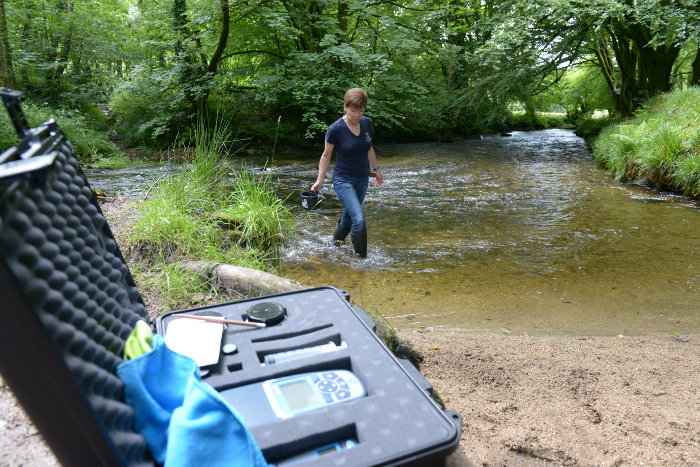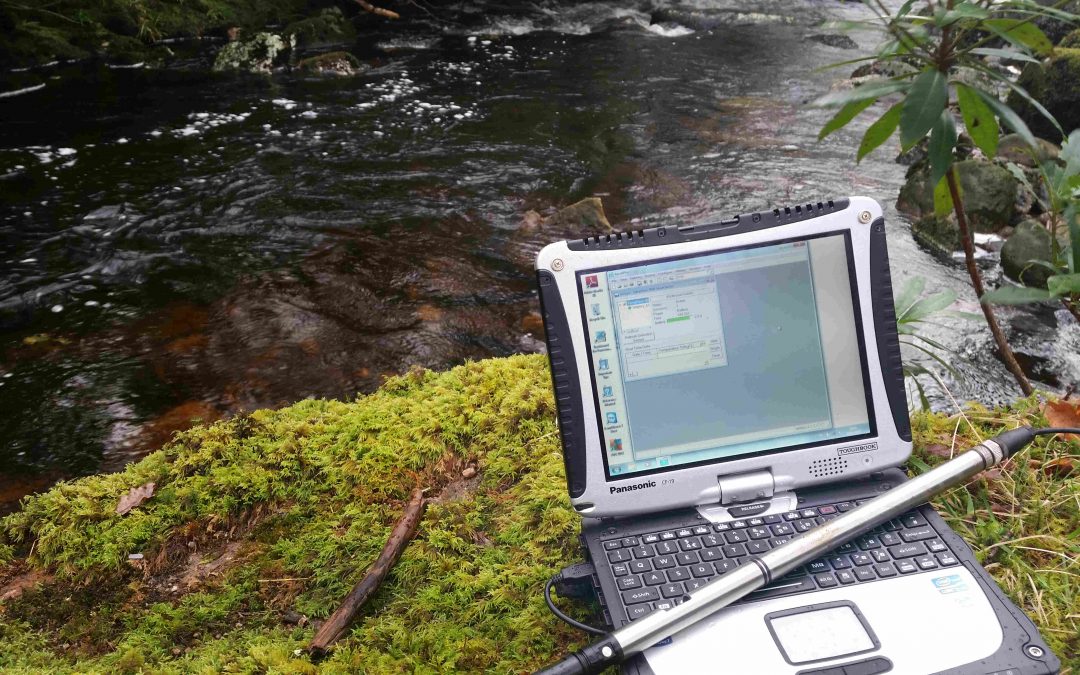
Simon Browning
To celebrate World Water Monitoring Day, our water quality monitoring lead Simon Browning shares his experience monitoring the rivers of the Westcountry.
I’ve been working for the Westcountry Rivers Trust for over three years and my role is to lead our water quality monitoring activities. One of the first things I did was to put together a set of portable monitoring kits for the Upstream Thinking project so that our team of farm advisors could carry out their own monitoring. These kits contain instruments to measure some of the key water quality parameters such as suspended solids and phosphate, temperature, total dissolved solids, pH and colour. The kits also contain all the ‘bits’ necessary to carry out the testing (test vials, cleaning cloths, reagents and pots for collecting waste) so that they are easy to use. Whilst the field instruments are not as accurate as having samples analysed in a laboratory it is more useful to us to have the instant results, and while the kits cost around £1,500 to buy, from then on, the costs are minimal (a single phosphate test cost around 40p, the other tests are free). You cannot tell everything about a rivers health just by looking – sediment is often obvious but many other issues are invisible. The water quality instruments help us detect if something is amiss and by getting the results instantly we always have the option of changing the planned survey and trying to track down the source instead.
We will normally visit 12 – 15 sites spread out across a river catchment in one day. The Upstream Thinking catchments are the Tamar, Dart, Exe, Otter and Fowey – key drinking water catchments across the South West. We try and find sites where a nice quiet country road crosses the river, and it’s important that we test tributaries and small streams as well as the main river. After seven or eight surveys – which are normally done at monthly intervals – we’ll start to get an idea of whether there are any persistent problems affecting that stretch of river. Chronic problems usually show up quite quickly – less obvious issues will take longer, or we may need to get lucky and spot an intermittent pollution source when it is active.

The kind of issues we are looking for are known as ‘diffuse pollution’ and tend to result from the way land is managed rather than one particular point source. Under Upstream Thinking we are delivering advice to farmers and other landowners so that they can manage their land in a more river-friendly way. Our water quality monitoring helps get our advice to where it is needed the most. In some cases, we can also contribute with funding for farm infrastructure improvements. Key issues that we can help with are fencing off watercourses – to keep cows and sheep out of rivers, helping to reduce runoff from cultivated land by creating vegetated buffer strips and improving soil condition. Healthy soil contains more organic matter and air so it acts more like a sponge and will hold onto more water, nutrients and chemicals. Without organic matter it can get easily compacted and then begins to behave more like concrete, rapidly generating runoff that can quickly pollute rives during heavy rain. There are many more measures that can protect the river environment and most of these also help farmers too. We all want to see valuable soil, expensive fertilisers and potent agrochemicals kept on the land and out of the rivers as much as possible.
Water quality ‘spot testing’ is just one of the ways Westcountry Rivers Trust assess the health of our river network. It’s useful for finding out about general issues and will typically be the first thing we do in a catchment before trying more sophisticated monitoring. Getting out regularly and seeing the rivers for ourselves is a great way to meet local people, many of whom will stop for a chat when they see us and it also helps to let people know that we are keeping an eye on the rivers.


Dear Sir/Madam,
I am the voluntary CEO of a not for profit group called Fishery Watch http://www.fisherywatch.co.uk), we operate a nationwide network of voluntary water keepers and we also represent anglers and the interest of angling on the whole.
We are having concerns passed to us by anglers and people that have fished this river for many years that the water is getting in a bad state, we are getting reports of things like fish not feeding as they used to, les insect life around the river and polutants being seen by these people in and on the water.
We are looking at undertaking a study of the river severn, what services can you offer us and at what rates as we will need to fund raise to meet any costs above a certain amount.
If you are not able to assist us, please can you point us in the right direction of a non government body that maybe able to help us.
Yours sincerely
Adrian Lane (CEO)
For and on behalf of Fishery Watch
Office: 0333 011 5888
Mobile: 07934 805049
Hello – thank you for getting in touch. It will be best for you to contact our colleagues at the Severn Rivers Trust via https://severnriverstrust.com/contact/
I hope they will be able to assist. Best wishes, Josie Purcell.